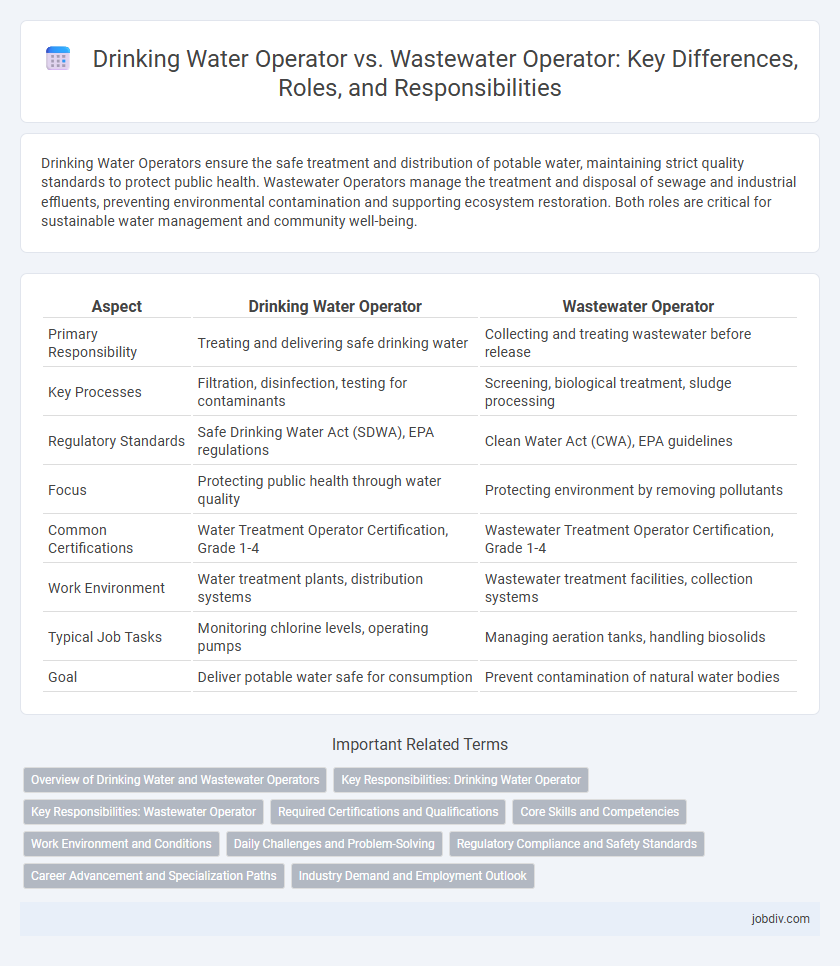Drinking Water Operators ensure the safe treatment and distribution of potable water, maintaining strict quality standards to protect public health. Wastewater Operators manage the treatment and disposal of sewage and industrial effluents, preventing environmental contamination and supporting ecosystem restoration. Both roles are critical for sustainable water management and community well-being.
Table of Comparison
| Aspect | Drinking Water Operator | Wastewater Operator |
|---|---|---|
| Primary Responsibility | Treating and delivering safe drinking water | Collecting and treating wastewater before release |
| Key Processes | Filtration, disinfection, testing for contaminants | Screening, biological treatment, sludge processing |
| Regulatory Standards | Safe Drinking Water Act (SDWA), EPA regulations | Clean Water Act (CWA), EPA guidelines |
| Focus | Protecting public health through water quality | Protecting environment by removing pollutants |
| Common Certifications | Water Treatment Operator Certification, Grade 1-4 | Wastewater Treatment Operator Certification, Grade 1-4 |
| Work Environment | Water treatment plants, distribution systems | Wastewater treatment facilities, collection systems |
| Typical Job Tasks | Monitoring chlorine levels, operating pumps | Managing aeration tanks, handling biosolids |
| Goal | Deliver potable water safe for consumption | Prevent contamination of natural water bodies |
Overview of Drinking Water and Wastewater Operators
Drinking water operators manage the treatment and distribution of safe, potable water by monitoring filtration, disinfection, and quality control processes to meet regulatory standards. Wastewater operators oversee the collection, treatment, and disposal of sewage and industrial waste, ensuring contaminants are removed before releasing water back into the environment. Both roles require technical expertise, regulatory knowledge, and operational skills to protect public health and maintain environmental sustainability.
Key Responsibilities: Drinking Water Operator
Drinking Water Operators maintain and monitor water treatment processes to ensure safe, potable water quality by controlling filtration, disinfection, and chemical dosing. They conduct regular testing for contaminants such as bacteria, heavy metals, and pH levels to comply with EPA regulations and maintain public health standards. Key responsibilities also include system repairs, routine maintenance, and managing treatment plant operations to prevent waterborne diseases.
Key Responsibilities: Wastewater Operator
Wastewater operators manage the treatment and disposal of sewage and industrial waste, ensuring compliance with environmental regulations and public health standards. Key responsibilities include monitoring treatment processes, operating equipment, conducting chemical and biological tests, and maintaining records to track plant performance. They also respond to system malfunctions, perform routine maintenance, and implement corrective actions to prevent environmental contamination.
Required Certifications and Qualifications
Drinking Water Operators must obtain certifications such as the Water Treatment Operator license issued by state regulatory agencies, requiring knowledge of water quality standards, chemical treatment, and distribution system maintenance. Wastewater Operators need certifications like the Wastewater Treatment Plant Operator license, emphasizing skills in biological and chemical treatment processes, sludge management, and regulatory compliance. Both roles typically require passing state exams and ongoing continuing education to maintain certification and ensure safe, compliant water and wastewater management.
Core Skills and Competencies
Drinking Water Operators require expertise in water treatment processes, chemical dosing, and monitoring water quality parameters such as pH, turbidity, and microbial levels to ensure safe potable water. Wastewater Operators focus on skills related to sewage treatment, including nutrient removal, sludge management, and understanding biological and chemical oxygen demand (BOD, COD) to prevent environmental contamination. Both roles demand strong analytical abilities, equipment maintenance proficiency, and regulatory compliance knowledge, but their core competencies differ based on the distinct treatment objectives and operational challenges.
Work Environment and Conditions
Drinking Water Operators work primarily in treatment plants focused on purifying water to meet safety standards, often experiencing controlled indoor environments with routine monitoring tasks. Wastewater Operators engage in processing sewage and industrial waste, frequently working in outdoor or partially enclosed facilities exposed to odors, variable weather, and physically demanding conditions. Both roles require adherence to strict regulatory guidelines and safety protocols, but wastewater operations typically involve higher exposure to hazardous materials and environmental challenges.
Daily Challenges and Problem-Solving
Drinking water operators manage the daily challenge of maintaining safe, contaminant-free water by regularly monitoring treatment processes and adjusting chemical dosages to meet regulatory standards. Wastewater operators face complex issues such as controlling chemical imbalances and managing sludge treatment to prevent environmental pollution and system failures. Both roles demand rapid problem-solving skills to address equipment malfunctions, fluctuating water quality, and emergency response situations to ensure uninterrupted water services.
Regulatory Compliance and Safety Standards
Drinking Water Operators ensure compliance with the Safe Drinking Water Act (SDWA) by monitoring contaminant levels and maintaining filtration systems to safeguard public health. Wastewater Operators adhere to the Clean Water Act (CWA) regulations by managing effluent quality and preventing pollutants from entering natural water bodies. Both roles require rigorous training and certification to uphold safety standards and regulatory mandates in water treatment facilities.
Career Advancement and Specialization Paths
Drinking Water Operators typically advance by obtaining certifications in water treatment and distribution, specializing in areas such as water quality analysis, system maintenance, and regulatory compliance. Wastewater Operators pursue career growth through expertise in wastewater treatment processes, sludge management, and environmental regulations to optimize plant efficiency and public safety. Both roles offer specialization paths that lead to supervisory positions, technical consulting, or regulatory inspection careers within municipal or industrial water management sectors.
Industry Demand and Employment Outlook
The demand for Drinking Water Operators remains strong due to increasing urban populations and stringent water quality regulations, driving steady employment growth in municipal water treatment facilities. Wastewater Operators face rising opportunities fueled by expanding environmental compliance requirements and the need for advanced pollution control technologies in both urban and industrial sectors. Industry projections indicate competitive salaries and career stability for both roles, with wastewater operations showing a slightly faster job growth rate driven by infrastructure upgrades and sustainability initiatives.
Drinking Water Operator vs Wastewater Operator Infographic

 jobdiv.com
jobdiv.com